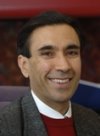Contribute
| In Conversation With Dr Sanjeev Arora |
Nirmala Garimella
08/21/2007
Dr Sanjeev Arora, admits on the telephone from
So what is Project ‘ECHO? It is an innovative medical delivery concept, that has been selected in the10 best (out of 307 entries)) for innovations in medical delivery in the Changemakers Collaborative Competition, "Disruptive Innovations in Health and Health Care". A prestigious panel of judges selected Project ECHO out of 307 participating innovations from 27 countries. As one of the 10 finalists of this competition, only three
will be declared winners by popular online voting. Dr Arora is dedicated to bring this technology and capability to Indian Doctors; where western state-of-the-art medical knowledge can be made available (on a specific patient basis, not just a generic lecture format) to the practicing doctors who otherwise do not have this access.
Lokvani spoke to Dr Arora, director of this project and Professor of Medicine and Executive Vice Chairman, Department of Medicine, University of New Mexico School of Medicine, over telephone at
Tell us about Project ECHO
It is a concept where specialists/experts from large medical institutions will connect with rural area medical practitioners and advice,inform,share and educate them with latest advances in treatment for diseases. This knowledge network aims to to empower rural doctors with support and information.
Your innovative project has been selected as the 10 top entries in medical delivery. Tell us how vital is it for people to vote on this and why?
It is vital because it is a cost effective way of delivering medical expertise to underserved areas. Think of
It seems that Technology is vital to this venture?
Yes, but a simple telephone or cell phone is enough where connectivity is an issue. The whole project fits in the interface of 4 main areas. The first is technological advance and interconnectivity. Second, the dissemination of best practices which mean better outcome. With constant knowledge infusion and training, a nurse can do what a doctor can do, one patient at a time. Third, case based learning, where management of real patient care becomes more case by case basis rather than just a lecture. Finally, there is the concept of the learning loop. When 15 to 20 doctors join in a knowledge network they learn from each other and share their experiences. If we can create knowledge networks in India for diseases like TB, HIV Malaria etc it will have a huge impact without investing in huge amounts of money. A simple device as a cell phone can be used to share best practices and connect people to best doctors.
If it did make it to the top entries, what would that mean to the Project and its potential?
The potential will be tremendous. It will give us international recognition and allow governments and other agencies around the world to adopt this model to provide health care to rural areas. It will also give us the resources we need to expand the model worldwide. It will also give the publicity we need so people are aware that such innovations are possible.
You hope is that you can implement this in
We are already in collaboration with the National Aids Control Organization (NACO), the central government agency in India and other private practitioners who have evinced interest. There are more than 3 million patients with HIV in India. If experts in India and elsewhere are willing to share their research and treatment options to clinics and other health spots in the rural areas in a periodic basis then a momentum can be created. During my last visit to
Support Dr Sanjeev Arora's project by voting in the Changemakers website at:
http://www.changemakers.net/competition/disruptive.
You can read his innovation at
http://www.changemakers.net/en-us/node/1036
The online voting begins on August 15 and runs to August 29. Winners
will be announced on August 30 and each will receive $5,000. In
addition, the Robert Wood Johnson Foundation's Pioneer Portfolio will
review competition entries and may award up to $5 million to support
projects in the
P.S. Please cast your vote as follows: It is quick and easy
1. Go to http://changemakers.net/en-us
2. Fill in (at a minimum) the fields marked 'required' in red. (You may, optionally, also wish to fill in your job title and position to establish credibility in discussions with other members of the changemakers community online). The Username is the name displayed when you write comments in the discussion section. It can be your real name or a pseudonym
3. To Register your profile, click 'Register your profile now' at the bottom of the profile page. (This takes you back to the main changemakers.net page)
5. Now, check your email. Changemakers will have sent you an email. Looking for an email with Subject: Login details for <yourName> at Changemakers and coming from: kherbst@ashoka.org
6. Follow the instructions in that email telling you how to click a link to get in and change your password. (At this point you can optionally fill in some additional preferences but none of this is required for voting). After changing your password, click Submit/Save
7. Click on the Competitions link.
8.. Under the heading Disruptive Innovations in Health and Health Care: Solutions People Want (with photo of boy and tongue depressor), Click the vote for winners link. Scroll down to see the 10 finalists (with checkboxes next to each proposal).
7. Review the 10 finalists' proposals and (optionally) comment on any one of them
8. To vote, check the boxes next to your top 3 proposals; then click the Submit button. (You must vote for exactly three proposals or the page will not accept your vote).
Thank you for your support of the Project ECHO proposal!
You may also access this article through our web-site http://www.lokvani.com/
